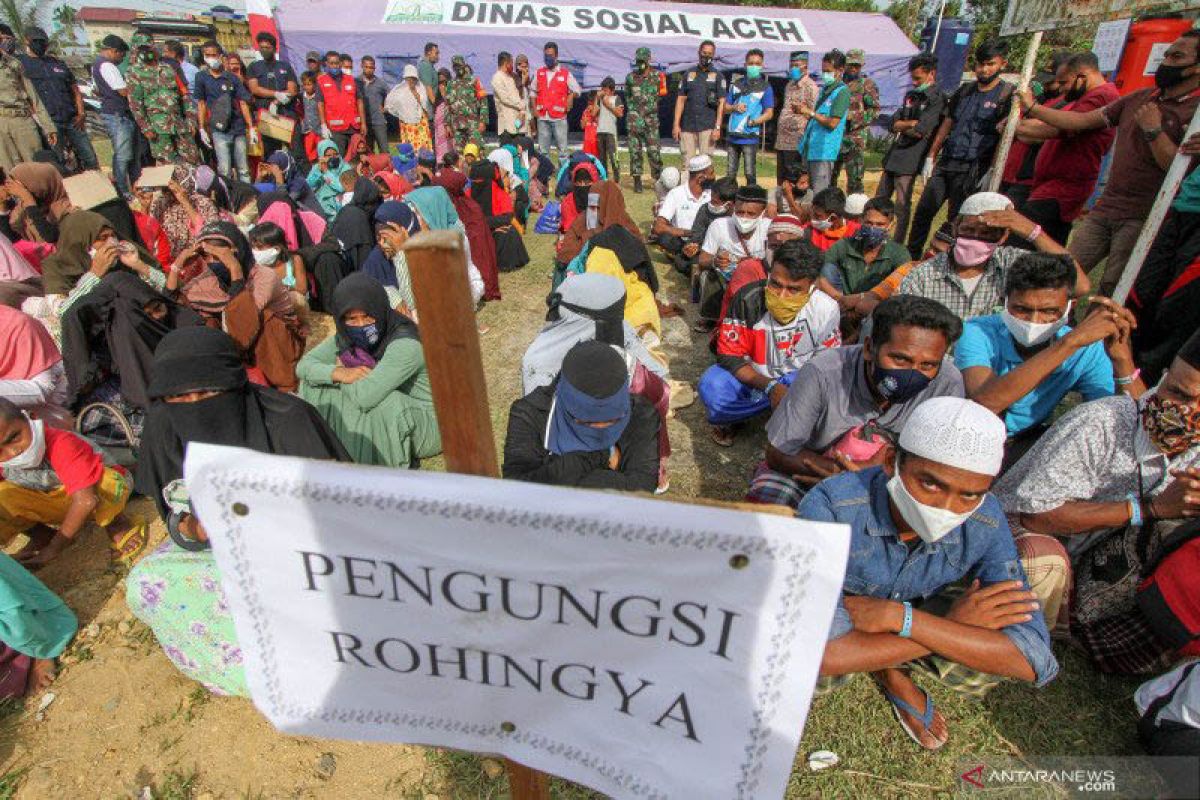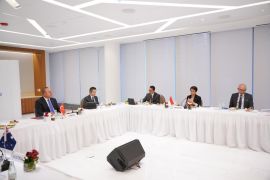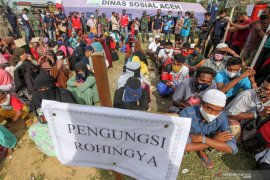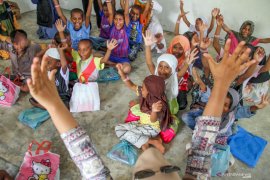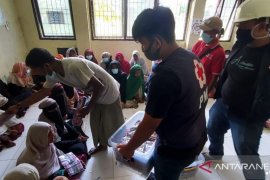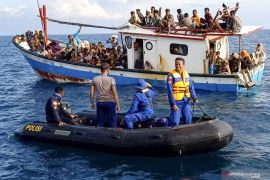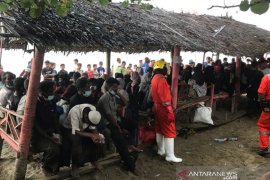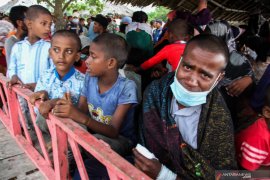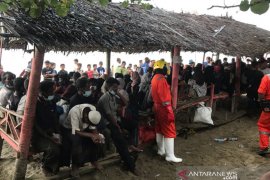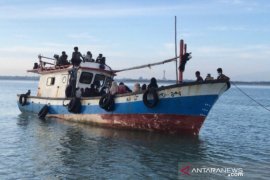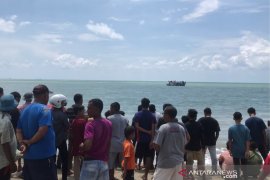The refugees, adrift in the middle of the sea for weeks aboard damaged boats, were rescued by Aceh fishermen.
Currently, 364 of them remain in Aceh, as 31 had escaped in order to reach Malaysia, which shares its marine border with Aceh, while four had died in the Aceh refugee camp.
Indonesia currently hosts over 900 human trafficking victims, who have become refugees on the high seas.
The Rohingya are a Muslim ethnic minority in Myanmar that have faced persecution at the hands of the Buddhist majority for decades. In fact, the UN reports show that Rohingya are the most persecuted minority in the world.
In May 2015, the Rohingya refugee crisis had grabbed international headlines when tens of thousands of Rohingya fled from genocide in Myanmar in overcrowded boats heading toward Thailand, Malaysia, and Indonesia.
Facing a genocide in their hometown of Rakhine State, Myanmar, nearly one million of them fled to the neighboring country, Bangladesh, in 2017, and were accommodated in the Cox’s Bazar refugee camp, the biggest refugee camp in the world today.
Their tragedy continues unabated, as the Rohingya refugee crisis has become a ripe ground for human trafficking since they were moved to a remote island in the Bay of Bengal, which could be inundated by a single strike from a cyclone.
Since January 2020, at least 2,400 refugees took to boats in the Andaman Sea and the Bay of Bengal, according to the UN refugee agency UNHCR.
Some 36 percent of the refugees are children. The vast majority are Rohingya people leaving from camps in Bangladesh – many of them victims of human trafficking – who had earlier fled violence and persecution in Myanmar.
Conditions on the boats are appalling, with a dearth of food and water and zilch healthcare, while survivors spoke of beatings and other abuse by traffickers on board.
Even in Aceh, they remain prone to the human trafficking network. Last November, the North Aceh District Military Command had thwarted an attempt of 14 Rohingya refugees to flee a temporary refugee camp at the vocational training center in Meunasah Mee Kandang Village, Lhokseumawe.
The military personnel also arrested eight suspected members of a human trafficking ring allegedly smuggling Rohingya immigrants into Aceh, according to spokesman for Aceh’s Rohingya Handling Task Force Lieutenant Colonel Am Oke Krisyanto.
The Rohingya misery has lingered on, as the Myanmar Government has allowed the atrocities to continue, while other ASEAN member countries could not stop it due to the regional grouping’s principle of non-interference in the affairs of the 10 member states.
Prior to the 37th ASEAN Summit in November 2020, dozens of current and former lawmakers from across Southeast Asia urged the policy-making body to ensure that its actions bring about a positive and sustainable change that contribute to ending the cycle of violence and displacement of Rohingya in Rakhine.
"While we welcome ASEAN playing a proactive role in the Rakhine crisis, there is so much more it can do to help bring it towards a resolution," an Indonesian MP and board member of ASEAN Parliamentarians for Human Rights (APHR) Mercy Barends noted in a statement last November.
"It is time for the ASEAN to articulate a coordinated and long-term strategy that addresses the root causes of this crisis. Failure to do so will risk causing further harm and suffering for the Rohingya and all other communities in Rakhine," Barends emphasized.
Furthermore, an escalating armed conflict between the Arakan Army and the Myanmar military endangers the safety of thousands of civilians from all communities, the MPs pointed out.
In their open letter, the lawmakers put forth several recommendations to the ASEAN on playing a proactive and positive role in resolving the crisis, including by promoting transparency in its decisions and ensuring meaningful consultation with the Rohingya and refugee communities, as well as with civil society actors.
"Until now, the ASEAN has allowed the Myanmar government to dictate the terms of its engagement on the Rakhine issue, but this week’s ASEAN Summit presents the perfect opportunity to change course and use its political leverage with the Myanmar government to push for measures that bring meaningful change on the ground in Rakhine State," Barends affirmed.
"We urge the ASEAN to develop a strategy that listens to the people most impacted by this crisis, and most importantly, one that abides by the principle of ‘Do No Harm,'" Barends stated.
Furthermore, the Human Rights Watch (HRW) urged the ASEAN to collectively press Myanmar to end rights violations in Rakhine, grant unfettered access to aid organizations and independent monitors, and address the underlying causes of the crisis.
“The ASEAN government’s focus on repatriation over safety and accountability reveals a callous disregard for Rohingya lives,” Brad Adams, the HRW Asia directors, noted in a statement issued prior to the 36th ASEAN Summit.
Some 16 humanitarian agencies also issued a statement on resolving the Rohingya issue, ahead of the 37th ASEAN Summit, on Nov 12-15, 2020. The agencies comprised ActionAid, CARE, International Rescue Committee, Médecins du Monde France, Japan, and Switzerland, Oxfam, People in Need Myanmar, Plan International, Save the Children, and Solidarités International.
Southeast Asian leaders must do everything they can to protect refugees and prevent a repeat of this year’s “boat crisis” when some 200 refugees lost their lives at sea, they emphasized.
The ASEAN Leaders’ Statements and the Foreign Ministers’ Joint Communiques have made reference to the Rohingya situation but have consistently expressed support for the Myanmar government and reiterated ASEAN’s expectation that Myanmar’s own Commission of Inquiry will impartially investigate human rights violations – something the UN fact-finding mission has said is impossible. “We also reaffirmed ASEAN’s continued support for Myanmar’s efforts to bring peace, stability, uphold the rule of law, promote harmony and reconciliation among the various communities, as well as ensure sustainable and equitable development in Rakhine State,” the ASEAN Leaders noted in a joint statement issued during this year’s Summit.
The ASEAN always comes up with beautiful slogans, such as “A Community of Caring Societies”, “One Vision, One Identity, One Community” and “ASEAN: A Community of Opportunities for All”.
However, the Rohingya seem to be invisible and remote in the ASEAN community policy, and as a consequence, ASEAN’s credibility is at stake.
Speaking at the 20th Anniversary of the United Nations Convention Against Transnational Organized Crime (UNTOC), Indonesian Foreign Affairs Minister Retno Marsudi specifically drew attention to the issue of Rohingya refugees as a form of organized human smuggling and trafficking in the region.
Marsudi re-emphasized the criticality of addressing the root causes of the Rohingya crisis through voluntary, safe, and dignified repatriation.
“For Indonesia, Myanmar is home to Rohingya refugees,” Marsudi stated.
Related news: Military thwarts Rohingya refugees' attempt to flee camp in Aceh
Related news: Transborder crimes continue unabated during pandemic: Marsudi
Related news: MPs seek ASEAN's positive, proactive role in Rakhine crisis resolution
Editor: Rahmad Nasution
Copyright © ANTARA 2020
